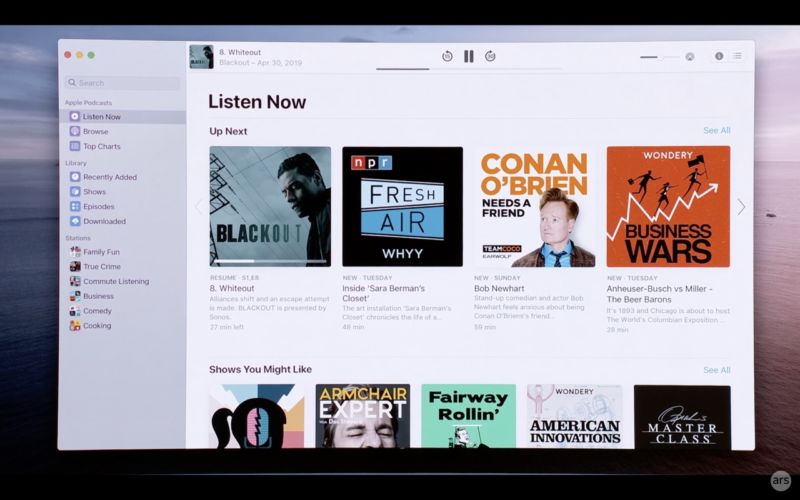
SAN JOSE, Calif.—As part of a slate of upcoming software updates, Apple will close the door on one of its most iconic pieces of software: iTunes. The company will split the application up into multiple, more-focused apps on the Mac: Apple Music for music, Apple TV for TV and movies, and Apple Podcasts for podcasts.
iTunes—a program for managing your media library, listening to songs, and buying new content—played a key part in the digital revolution of the 2000s after it first launched in 2001. Its impact started with music. iTunes was partly credited with slowing the severe bleeding to piracy the recording industry faced amid the popularity of the MP3 boom on peer-to-peer file-sharing applications like Napster. And the program was also the home base for the iPod, one of the first of many products CEO Steve Jobs oversaw when steering the company back to success after he returned to his leadership position in 1998.
It was lauded as a powerful tool for managing your music library in that it allowed you to not only sort, manage, and play music you bought from Apple's online store, but it also let you import music files acquired from other sources and even sync them to your cloud-based library. Apple later introduced new media types to iTunes as it expanded its services and content offerings: movies, TV, podcasts, books, and audiobooks. iTunes was also the primary method for backing up, updating, and managing iOS devices like the iPhone, iPod touch, and iPad before iCloud took center stage in recent years.
However, as the features piled on, many users felt that the application became overcomplicated and unwieldy. Apple launched a streaming music service called Apple Music in 2015, which added even more layers, and some critics began pointing to the application as a leading example of unintuitive and even bad user-experience design—hardly something Apple wanted to be known for.Apple has already spent a couple of years siphoning off some iTunes features to other apps in iOS, its mobile operating system for iPhones and iPads. But the app largely remained the primary hub on Macs until this new update, which is expected to launch for supported Macs later this year.
Going forward, Mac users will be able to sync their iOS devices' music libraries in the Mac's Finder. The backup-and-restore functionality for iOS devices that currently exists in iTunes will also be available in the Finder.
Apple did not say what will happen with iTunes for Windows. Apple also did not say how existing users will be able to port media libraries from iTunes to the new apps. Apple didn't mention books today, but much of iTunes' book and audiobook functionality was already moved to Apple's Books apps.
While most functionality offered by iTunes will still be offered, just in different applications, the sunsetting of iTunes marks something of an end of an era for the music industry. Now, more and more users are moving forward into the streaming era—a landscape of kaleidoscopic subscription services for music, TV, film, and more. It's in this landscape that Apple primarily sees its future—and the future of entertainment.
Update: We've published an update with some answers to common questions about iTunes on Windows, old libraries, and Dolby Atmos.
Listing image by Nicolas Raymond / Flickr
reader comments
213